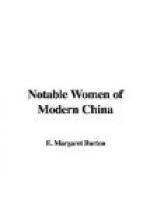In an article on “Hospital Economics” she speaks of the efficient service of these nurses:
“I am blessed with five consecrated young women,” she says, “who have completed a course of nursing and studies with me, and I have divided the work into different departments, holding them responsible for the work and for the younger nurses under them. For instance, one of the graduates is the matron, who looks after all the housekeeping and the accounts, watching for the best market time for buying each article in connection with the diet, the best foodstuff for the money expended, and looks after each and all of the servants so that they do their work properly. Another graduate nurse looks after the dispensary, the filling of prescriptions, the weighing and compounding of medicines, and superintends the sale of drugs in that department. Another one has charge of all in-patients upstairs, and another downstairs, including private cases, with junior nurses under her. These look after the special diet, and the carrying out of orders in all the wards and the charting of records. (This is done in English.) Still another nurse has charge of the operating room, with all of the sterilization necessary for all major and minor operations, the distillation of water, and the responsibility of going out to cases with the doctor. In this way it is arranged that in case of all operations the one doctor has her assistants in the operating room, and yet does not interfere with the regular working of the hospital.”
“Dr. Stone is multiplying herself many-fold by her splendid training of nurses in the Kiukiang hospital,” is the verdict of Mrs. Bashford, wife of the Methodist Missionary Bishop of China. She has watched Dr. Stone’s work with keen and intelligent interest, and her opinion seems to be justified by the results. When after weeks of unusual strain Dr. Stone was persuaded to take a short vacation in the mountains back of Kiukiang, her corps of fourteen nurses, five of them graduates, kept up the work of the hospital, and treated about eighty patients a day in the dispensary. Twice, in answer to telegrams, Dr. Stone returned to Kiukiang, only to find each time that everything had been done to her entire satisfaction. “Were it not for the efficient help I have from my nurses, I should not be able to manage this work at all,” she says.
Doubtless one great reason for Dr. Stone’s success in raising up efficient workers is her confidence in them, and her sympathetic attitude toward them. “I believe many a valued worker is lost to her profession through lack of sympathy and encouragement when needed,” she once said. “Surely the Lord values the workers as well as His work, and we who want our work to prosper cannot afford to ignore the interests of those upon whom we depend so largely for success.”




